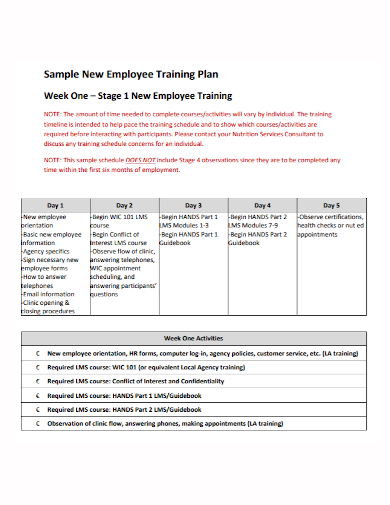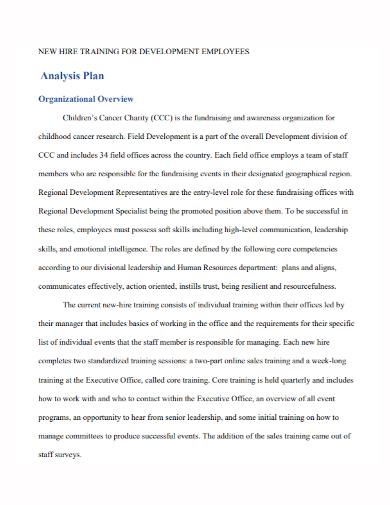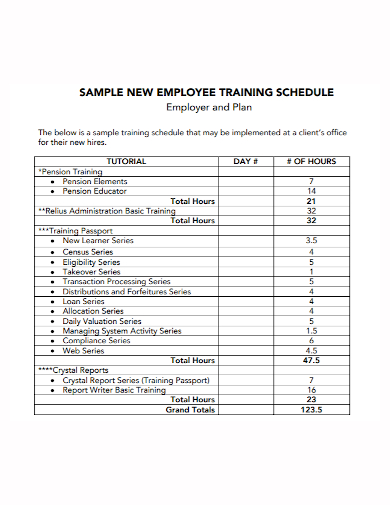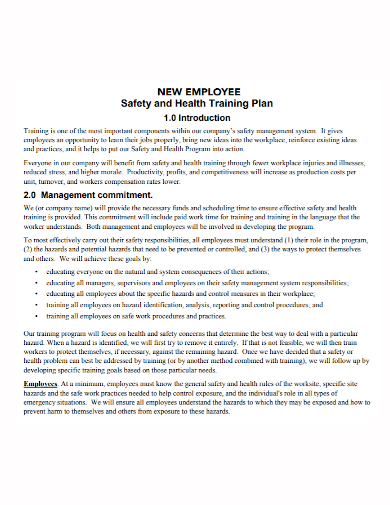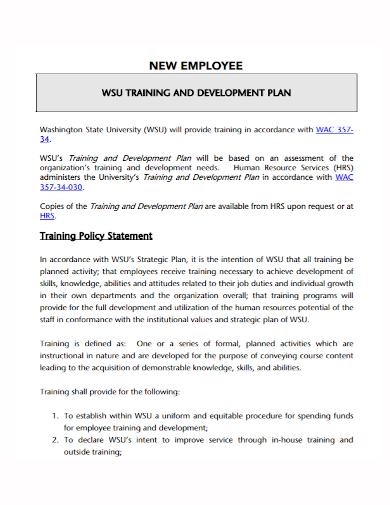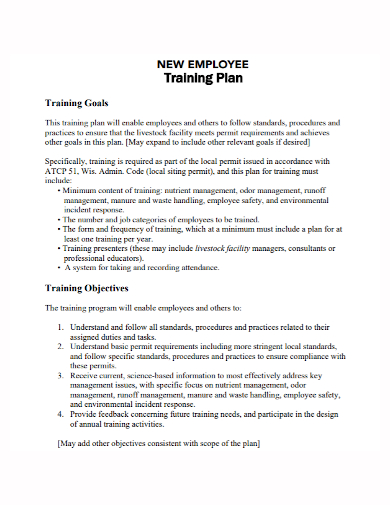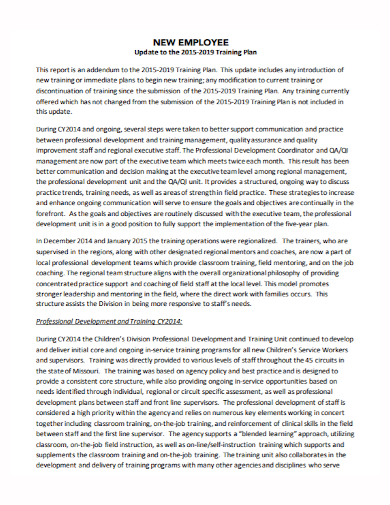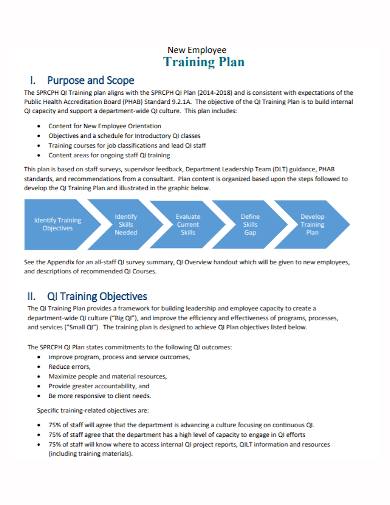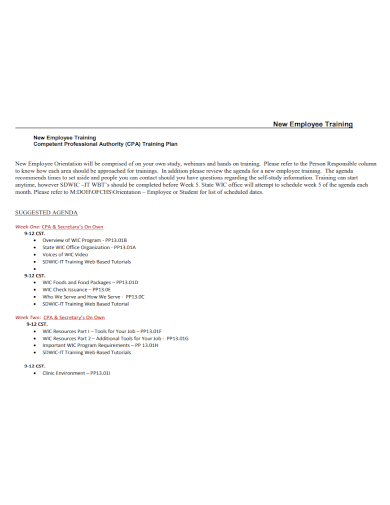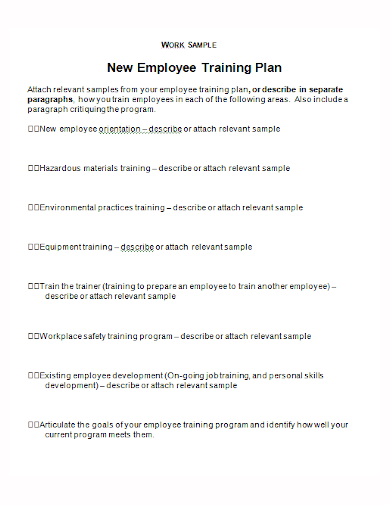Depending on a company’s rules and policies, new employees are subjected to different kinds of employee training programs. These training plans or programs are normally conducted for various reasons such as to orient employees with the company, to get them settled down with their job roles, to enhance their work performance and etc. Implementing such programs would make new employees feel more equipped with the right skills to take on the job given to them. This would also lower turnover rates, and improve productive working relationships. Developing and deciding on what training programs to implement requires a new employee training plan. If you are responsible for organizing such, then careful planning is needed. Read more about this in our article below and do check out our free new employee training samples as well.
10+ New Employee Training Plan Samples
1. New Employee Training Plan Template
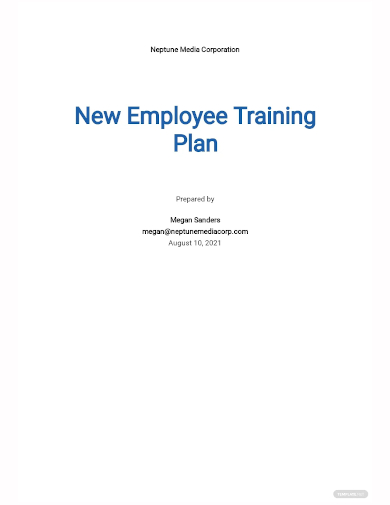
2. New Employee Training Plan
3. New Employee Training Analysis Plan
4. New Employee Training Schedule Plan
5. New Employee Safety and Health Training Plan
6. New Employee Training Development Plan
7. New Employee Training Goals Plan
8. Sample New Employee Training Plan
9. Standard New Employee Training Plan
10. New Employee Professional Training Plan
11. New Employee Training Work Plan
What Is a New Employee Training Plan?
Without new employee training programs, an employee would see overwhelmed if not intimidated on the role given to him or her. With training programs, new employees will become more at ease and more confident to work seeing that their new company cares for their well-being and career development. Now, there are various new employee training programs to choose from depending on the type of industry your company is in.
As you brainstorm with the company’s management, you need to figure out the best training programs that can not only benefit the new employees but the company’s as well. With a new employee training plan, you and your team will be able to come up with the appropriate employee training programs that will best suit your new employees and guarantee its success.
How To Develop a New Employee Training Plan?
You will need to develop a new employee training plan that that will help new hires get familiar with the company right away. These would refer to onboarding, compliance training, role-specific training, process training, and elective learning. Part of developing a new employee training plan, you must first identify the goals you need to achieve and what would the different training plans be of help to the employee and the company itself.
Weighing down the benefits of introducing a training plans would improve employee engagement and increase efficiency in the workflow process, and teach employees to be problem solvers as they learn how to be creative and innovative. Overall new employee training would improve an employee’s working life and his or her relationship with the company and of others. Now to start, here are the different components that will help you develop a new employee training plan:
I. Identifying the Learning Needs of Your New Hires
In order to determine what type training programs your new hires would need, understanding what part of their performance needs to be improved or changed. Also try to talk to managers in each department to find out what type of information would be beneficial for which roles.
II. Topics To Be Covered
Once you have identified those needs, translate this to training goals. In this way you will be able to determine which particular training topics to be included in your training programs. Examples of these are as follows:
- Onboarding or New Employee Orientation
- Job/Role Orientation
- Product or Service Training Programs
- Skills Development
- Compliance and Workplace safety training
- Productivity Training
III. Timeline For Each Training Program
There should be a given timeline or deadline for each training program conducted. This will ensure that all the necessary information has been properly utilize and that new employees are able to grasp the knowledge and instruction in a correct and given pace. Meaning training programs must be conducted with the right amount of time, not too fast nor too slow.
IV. Learning Method
Each new hires have different ways to learning things, which will also depend on the job they have been hired for and their past experiences as well. So it is important that your new employee training plan should be adaptable to various learning styles. Conforming to a new employee’s preferred learning method can help your training stick more quickly, reducing the amount of instruction a new employee needs before they can perform in their role effectively. Such methods could be done by reading, visuals or repetition.
V. Select The Appropriate Mentors or Trainers
Get everyone relevant involved, even from top management. Carefully consider which candidates could best guide and coach other employees. Then, involve them in the development and execution of your new employee training plan.
VI. Monitor and Assess
After each training program, it is best to check-in with your new employees. See to it that they have understood what they have learned, or if there are any improvements with their work performance. By doing so you will be able to see what needs to be change, or if an employee still require additional training.
FAQs
What Is Employee Onboarding?
This is the process of introducing new employees to a company and its culture, as well as getting a new employee the tools and information needed to become a productive member of the team.
What Is a Training Strategy?
This is a tool which is designed to achieve an educational goal, such as teaching a new skill or updating employees on new policies or change management.
What Is an Employee Needs Assessment?
This identifies the specific knowledge and skills that employees need to become more productive, efficient and competent in their job.
Develop a new employee training plan that is adaptable and relatable to the usual task of your new employees. Always consider each new employee’s unique learning style and preferences so you can optimize the instruction they receive during training.
Related Posts
Sample Training Survey
FREE 19+ Onboarding Checklist Samples
FREE 10+ Training Reimbursement Agreement Samples
FREE 10+ Job Training Checklist Samples
FREE 10+ Sample Training Agreement
FREE 9+ Training Contract Samples
FREE 8+ Safety and Health Training Plan Samples
FREE 15+ Training Manual Samples
FREE 10+ Staff Training Program Samples
FREE 10+ Project Training Plan Samples
FREE 10+ Finance Skills Samples
FREE 10+ Employee Career Development Plan Samples
FREE 9+ Employee Training Agreement Samples
FREE 9+ Corporate Training Plan Samples
FREE 5+ Apprenticeship Training Plan Samples

